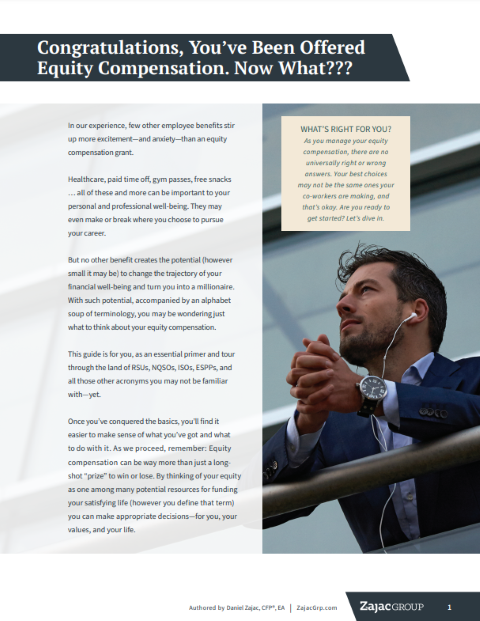For one reason or another, you may find yourself packing up and moving to another state while still working for your employer. Perhaps you’re given the opportunity to work remotely, your spouse is pursuing a career change, or you’ve been relocated to another corporate site. Whatever the case may be, moving comes with its own set of logistical challenges. But there’s another piece of the puzzle to consider once the dust has settled—how moving might impact your tax situation.
When you change your state of domicile (essentially your permanent residence), do you know how it will impact your tax liability, and more specifically your equity compensation?
Depending on where you move, you may have state-specific regulations to abide by. Here’s a look at the general guidelines for moving from one state to another while managing your equity compensation’s potential tax liability.
What Is the Significance of Your Domicile?
The term “domicile” is used to describe the home where you maintain permanent residence. It’s a term primarily used for legal and tax purposes.
For example, your state of domicile refers to the state in which you:
- Registered to vote
- Applied for a passport
- Titled your car
- Have a driver’s license
- Pay state taxes
- File lawsuits
While you may own properties across several states, typically only one state can be considered your domicile. There is no singular action that ensures your home is declared your domicile. Rather, you have to be able to prove your intent to remain living in that home permanently—even if you own multiple properties. You may spend six months in Connecticut and six months in Florida, for example, but only one is your domicile.
How Your Domicile Impacts State Taxes
As we move forward with the examples below, remember that these guidelines may apply if you change your state of domicile (i.e. permanently relocate your family home to a new state). Temporarily working from a different state or buying a vacation home across the country doesn’t necessarily mean you’ll owe state taxes on your equity compensation elsewhere.
You will generally be required to pay taxes for your state of domicile. Now, this has the potential to complicate matters when you move, especially when equity compensation is involved.
If you move to a new state and establish a different domicile during the vesting period, you may be required to split the tax bill between both states. It’s especially important to understand what your future state tax bill could look like when moving to or from a high income tax state, such as California.
Let’s take a closer look, based on equity comp type.
Restricted Stock Units (RSUs)
As a reminder, RSUs are taxed as compensation income once they vest. They’ll appear on your W-2 at the end of the year and are subject to federal as well as state income taxes.
Which state is entitled to collect state income taxes once your units vest? The answer will depend on where you lived and worked while those units were vesting.
To best understand how your RSUs could be taxed based on a move mid-vesting period, we’ll demonstrate with the following scenario.
Let’s say you have RSUs with a four-year vesting schedule, and 25% of your units vest per year.
Scenario A: Assume you live in Pennsylvania the entire four years your RSUs are vesting. Because you did not change your state of domicile, 100% of your units will be subject to Pennsylvania’s state taxes.
Scenario B: Now, let’s say you live in Pennsylvania for one year, but move to New York State starting in Year 2.
Because your state of domicile changed, only the proportion of your units that vested while living in PA will be subject to PA state tax. The percentage of units that vested while you’re living in New York will instead be subject to New York state tax.
Here’s how that would look across the full four-year vesting period:
| Year 1 – 25% | Year 2 – 50% | Year 3 – 75% | Year 4 – 100% | |
| Domicile | PA | NY | NY | NY |
| Time spent in each state | 1 year in PA | 1 year in PA & 1 year in NY | 1 year in PA & 2 years in NY | 1 year in PA & 3 years in NY |
| Percentage taxed by each state | 100% PA | 50% PA & 50% NY | 33% PA & 66% NY | 25% PA & 75% NY |
Now, let’s look at this scenario again using dollar amounts to better illustrate the income subject to each state’s income tax.
Assume you’re awarded 4,000 shares total, with 1,000 shares vesting each year during the four-year vesting period. Here’s how the tax liability would be split based on your move from Pennsylvania to New York after Year 1.
| Year 1: 25% | Year 2 – 50% | Year 3 – 75% | Year 4 – 100% | |
| Price at vesting | $50 | $75 | $125 | $80 |
| Cost per 1,000 shares (25%) | $50,000 | $75,000 | $125,000 | $80,000 |
| Domicile | PA | NY | NY | NY |
| Time spent in each state | 1 year in PA | 1 year in PA & 1 year in NY | 1 year in PA & 2 years in NY | 1 year in PA & 3 years in NY |
| Proportion taxed to each state | 100% PA | 50% PA & 50% NY | 33% PA & 66% NY | 25% PA & 75% NY |
| Total taxable RSU income per state | $50,000 in PA | $37,500 in PA & $37,500 in NY | $41,250 in PA & $83,750 in NY | $20,000 in PA & $60,000 in NY |
In total, $148,750 of your vested RSUs over the four-year vesting period would be subject to PA tax, while $181,250 would be subject to New York state income tax.
Why You May Owe Tax in Multiple States
As you may have noticed in the example above, leaving a state doesn’t mean you’re exempt from paying taxes to it when your RSUs vest. This is because an RSU’s tax liability is determined by how many days you work in the state from the day the units are granted until the day they vest.
Below is an example of this, based on the same assumption that you moved from Pennsylvania to New York after Year 1. (260 days represents a typical working year, 5 days a week for 52 weeks):
| Grant Date | Vest Date | Days Worked in PA | Days Worked in NY | Total Work Days |
| 1/1/2025 | 1/1/2026 – 25% | 260 | 0 | 260 |
| 1/1/2025 | 1/1/2027 – 50% | 260 | 260 | 520 |
| 1/1/2025 | 1/1/2028 – 75% | 260 | 520 | 780 |
| 1/1/2025 | 1/1/2029 – 100% | 260 | 780 | 1,040 |
Even though you lived in New York when your RSUs vested in years 2, 3, and 4, the time those units spent vesting while you were in Pennsylvania still makes them subject to some PA state tax.
Non-Qualified Stock Options (NQSOs)
NQSOs are not subject to tax when they’re granted or when they vest. Rather, you’ll owe ordinary income tax once you exercise your options. How much you owe will depend on the exercise (strike) price and the fair market value of the shares on the day they’re exercised—this difference is called the “spread.” Whether you choose to hold onto your options after exercising or sell them right away, the full spread is taxed. Once the shares are sold, you’ll again owe capital gains tax on any profit.
NQSOs will be taxed proportionally based on where you lived and worked while the shares were vesting (similar to RSUs). Even if you exercise your options post-vesting while residing in a different state, so long as the options were vested in the previous state, that’s where the income tax will be paid.
Using the example above, let’s say your NQSOs were again subject to a four-year vesting period. During Year 1, you lived in Pennsylvania before moving to New York. After four years, all your shares have vested, and now you’ve decided to exercise them. Even though you’re exercising while living in New York (which is a taxable event), a portion of your exercised options will be subject to Pennsylvania state tax.
Again, we can refer to the table above, as the exact percentage of PA vs. NY tax liability will depend on the number of days you worked in each state while the options were vesting.
Incentive Stock Options (ISOs)
ISOs are a little trickier tax-wise since they can be subject to different types of taxation, based on a few factors.
No tax is collected when the options are granted or when they vest. You do not owe state income tax when you exercise your ISOs either. However, you may be required to include the spread (the difference between the exercise price and fair market value of the exercised options) when calculating AMT. This increases the odds you’ll be subject to paying AMT in the year your ISOs are exercised.
Let’s pause here and take a look at the potential state tax liability based on the actions taken so far (ISOs have been granted, vested, and exercised but not sold).
Scenario A: AMT is not triggered.
While AMT is common with ISOs, it’s not agiven. In the event you do not trigger AMT when exercising your options, no federal or state AMT is owed.
Scenario B: AMT is triggered.
It’s possible, however, that you’ll owe federal AMT on your exercised options.
In terms of state AMT liability, only a few states currently implement a state-level AMT:
- California: 7%
- Colorado: 3.47%
- Connecticut: Either 19% of adjusted federal tentative minimum tax or 5.5% of adjusted alternative minimum taxable income, whichever is less.
- Minnesota: 6.75%
Keep in mind that each state has its own thresholds, exemptions, and guidelines. Similar to the scenarios above, you may owe state-level AMT if you move to or from a state that imposes AMT during the vesting period—even if the options are exercised in a different state. For example, if you live in California for a year before moving to Texas while your options vest, you may still owe some California AMT once the ISOs are exercised.
If you live in states where no state-level AMT is collected, your exercised options will only be subject to federal AMT liability.
Qualified vs. Disqualified Sale
When you sell exercised options and earn a profit, the capital gains will be subject to tax. Depending on the terms of the sale, however, you may be able to enjoy more favorable tax treatment.
Again, let’s assume you move from Pennsylvania to New York during the four-year vesting period. Here’s how that could impact your state capital gains tax liability based on the type of sale.
Qualified Sale: If you’ve held your exercised shares at least two years after your grant date and one year after you exercised them, it’s considered a qualified sale. When that’s the case, the profits are generally taxed at the more favorable long-term capital gains tax rate.
When your shares are sold in a qualified sale, the long-term capital gains are typically subject to tax only in the state of domicile at the time of the sale.
Disqualified Sale: If you do not meet the criteria shared above, the shares will be sold in a disqualified sale. This happens when the shares are exercised and sold at the same time. Profits from a disqualified sale are often taxed as ordinary and/or capital gains. If this occurs, some of the income may be taxed based on the percentage of time spent working in each state—similar to NQSOs and RSUs, and some of the time (the capital gains portion) could be taxed only in the state of domicile.
Managing Your Equity Comp During a Move?
Since moving between states entails plenty of complexity in and of itself,, the last thing you want to think about is how this could impact your tax bill in the future. If you have questions about your equity compensation or other factors that could impact your tax bill in the coming year, we encourage you to reach out to our team. Send us a message, or schedule an introductory call with our team today.










0 Comments